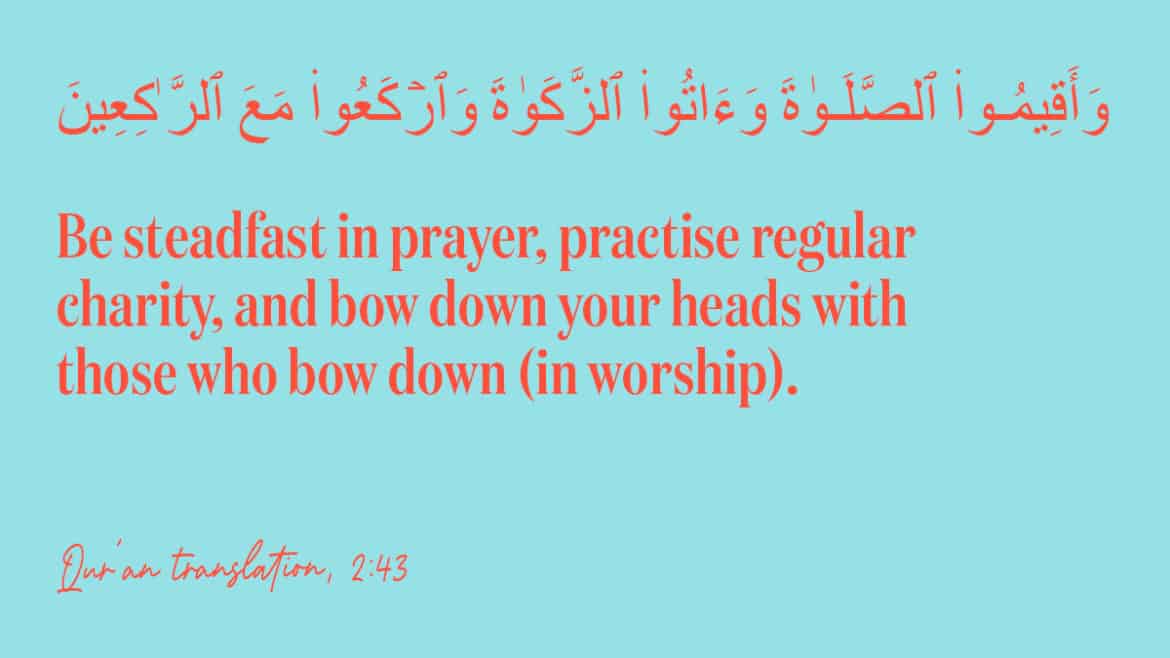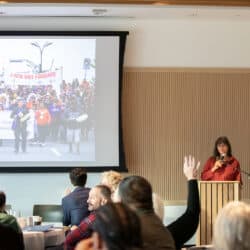Over the past year, academics and policy experts have been reporting on what appear to be discriminatory practices in the CRA’s audits of Muslim-led charities. Contributor Memona Hossain suggests six ways the sector can help confront this systemic flaw and work with the Muslim charitable sector to build a strong, authentic, and unapologetic Muslim narrative.
Canada’s charitable sector plays a crucial role by providing support to the most vulnerable segments of society, in Canada and around the world. It also provides services and education to faith communities, while creating employment for more than two million people and contributing significantly to the economy. While the sector advocates for equality in Canada, it must also take a stand against the alleged systemic discrimination that Muslim charities have experienced by the Canada Revenue Agency (CRA), which has had a devastating impact on the community. The practices have had negative emotional, financial, and institutional impacts within the Muslim community and have hindered the advancement of Muslim institutions and meaningful charitable work in our country.
Academics and policy experts have been reporting on what appear to be discriminatory practices in the CRA’s audits of Muslim-led charities.
Over the past year, academics and policy experts have been reporting on what appear to be discriminatory practices in the CRA’s audits of Muslim-led charities. Research conducted by the Institute for Islamic Studies at the University of Toronto and the International Civil Liberties Monitoring Group suggests that the Review and Analysis Division (RAD) of the CRA unfairly targets Muslim charities through its risk-based approach of selecting charities for audit, and by framing its findings through a lens of bias and Islamophobia. In recent hearings of the Senate standing committee on human rights, chaired by Senator Salma Ataullahjan, the findings of these reports were reaffirmed in testimony by witnesses and by the CRA itself.
While the Muslim charitable sector has invested significant resources in confronting this serious systemic flaw, supported by extensive research and media coverage, there has been a jarring silence from the wider sector.
Advancement of religion has been an important aspect of the charities sector, and charities registered with this purpose have served Canadians for centuries. The Muslim charitable sector has played a pivotal role in reaching communities that are otherwise inaccessible to general charities, which lack the deeper understanding and relationships within grassroots communities. As the COVID pandemic has emphasized, grassroots faith-based charitable work plays a decisive role in the well-being of marginalized communities in ways that governments are unable to tap into. The Muslim charitable sector is the heart of the community; it connects members, provides meaningful social networks, nurtures community well-being, and helps formulate a grounded self-identity. Within the Islamic worldview, charity and the very act of giving are acts of worship that connect the individual to the collective:

The Muslim charitable sector is intrinsically linked to the founding of mosques, schools, social programs, and other essential community services that bring meaningful supports, services, and a sense of community to millions of Canadians.
Yet, years of systemic discrimination have left the community constrained at a time when community-based supports are acutely needed. As Nabil Sultan, former chairman of the Muslim Association of Canada (MAC), recently explained before the Senate human rights committee, “these discriminatory practices by the CRA against Muslim charities have had a devastating impact on the services and programs upon which tens of thousands of Canadian Muslims and other beneficiaries rely. Muslim charities have been forced to divert significant human and financial resources from serving their communities to defending themselves against these practices. They have had a chilling effect on the Muslim community, making Muslims wary of supporting Muslim charities and seeking their services, further marginalizing a community already impacted by Islamophobia.”
The CRA’s practices have had a chilling effect on the Muslim community, making Muslims wary of supporting Muslim charities and seeking their services, further marginalizing a community already impacted by Islamophobia.
Nabil Sultan
The CRA’s apparent targeting of Muslim charities has had far-reaching consequences, putting the community’s resources at risk. Muslim organizations such as IRFAN-Canada, whose charitable status was revoked, and Human Concern International and ISNA Canada, who faced one-year suspensions of charitable status, were subject to intense audits that have resulted in irreparable damage to the organizations and harm to their beneficiaries. In addition to having their funding either temporarily or permanently cut off, those that have had their status either suspended or revoked by the CRA also encountered difficulties obtaining banking services, further reinforcing the catastrophic effects of these audits.
The 2021 census indicates that today’s Muslim community is made up of 1.8 million newcomers, older settler families, and multi-generational families who are weaving together a presence that has grown dramatically since the first census of 1871, which counted 13 Canadian citizens who identified as Muslim. Canada’s history of a colonial project forcing a Western orientalism framework has challenged many communities with preserving their distinct cultural and faith identity. Substantial amounts of research indicate the crucial role religious institutions and social networks play in nurturing communities, their well-being, and civic engagement. Early places of worship brought diverse communities and peoples together, and Muslims in Canada established charities to meet both domestic and international humanitarian needs. The first generations of immigrant families were dedicated to preserving their religion and traditions by establishing mosques and schools. Organizations like the Muslim Association of Canada (MAC) have been instrumental through these phases of community development.
Then, in 2001, in the aftermath of the 9/11 attacks in the United States, the community’s progress was disrupted and compounded when a sudden spotlight was cast on the Muslim community. Since then, statistics indicate a rise in anti-Islam sentiments and an increase in hate crimes against Muslims. The government hastened to pass controversial new national security legislations granting Canada’s national security regime, CSIS and the RCMP, unwarranted power to restrict, monitor, and intrude into the lives of citizens. This legislation contravened human rights and directly targeted the Muslim community, and the implementation took the form of security certificates, secret evidence, no-fly lists, and entrapment, among other controversial techniques. Maher Arar, the Toronto 18, Mohamed Harkat, Abdulrahman El Bahnasawy, and many others continue to be victims of an unjust system.
For two decades, Muslims across the country – children, youth, and adults alike – have borne the burden of defining their very existence in the face of prevailing fear and insecurity, affecting both the individual and the collective. Breeding hatred and intolerance has caused Muslims to become victims of some of the most atrocious acts of violence to occur on Canadian soil. The shooting at the Quebec City Mosque, the murder of the Afzal family in London, and an increase in hate crimes and incidents across the country are all examples.
The CRA’s Charities Directorate’s alleged targeting of the community at its heart – its charitable work – raises the crippling spectre of systemic Islamophobia. In its testimony before the human rights committee, the Canadian Muslim Public Affairs Council (CMPAC) explained that “auditors are using their biases to demonstrate that the teachings of Islam do not meet the public benefit test. They also believe that Islamic religious practices are not in fact religious.”
The Muslim Association of Canada has a responsibility to stand up to bias, in the interest of all Muslim groups, but also in the interest of all Canadians.
MAC
Islamophobia affects everyone. Recent research on the impact of Islamophobia on youth identity has found that Islamophobia challenges their “sense of identity and belonging, their mental health and well-being, and their faith.” Psychological research on the impact of Islamophobia on Muslims indicates that “overwhelming pressures faced by this group, including surveillance, hate crimes, and institutional discrimination, stimulate an urgent need” for supports. These are also some of the reasons that have led MAC, the largest Muslim charity in Canada, to launch a charter challenge against the CRA in the Ontario Superior Court for allegations of Islamophobia by the agency, proclaiming, “Systemic bias hurts all Canadians. MAC has a responsibility to stand up to systemic bias, in the interest of all Muslim groups, but also in the interest of all Canadians.”
What can the sector do?
- Sign open letters and petitions that demand change. Solidarity means putting your name behind it and demanding eradication of systemic discrimination.
- Make personal connections with Muslim charities. True solidarity is embodied through relationships. How many Muslim organizations does your charity actually have partnerships with? Checking in and showing support goes a long way.
- Amplify voices – post relevant stories on your social media. Use your platform to give voice to this issue and inform your stakeholders and community about how they can take meaningful action. Be a catalyst to mobilize change.
- Ask government leaders to advocate for action to eradicate systemic Islamophobia. Request meetings with your local political leaders and ask them what they are doing about this issue. Show the government that systemic Islamophobia is an area of concern for everybody
- Write and be public about your support/position. Be a part of the discourse and help change the narrative by engaging in public forums, publishing on public platforms, and being vocal in requesting that this issue of Islamophobia be addressed.
- Put it on your organization’s agenda. The only way to activate the five points above is to prioritize and ensure that tackling systemic Islamophobia is an item on your organization’s agenda.
Now is the time for the sector to play an active role in working with the Muslim charitable sector to build a strong, authentic, and unapologetic Muslim narrative.
Muslim families, children, and youth have a right to imagine, dream, and work toward a future that thrives through an authentic self-narrative. The efforts of realizing the dreams of yesterday have been unjustifiably interrupted. Now is the time to ensure that the dreams of today will have a fair chance at becoming the realities of tomorrow. Not all groups within the charitable sector have the luxury of investing in its future in the same way. Now is the time for the sector to think deeply about how to avoid becoming an enabler in such a process of disenfranchisement, and instead to play an active role in working with the Muslim charitable sector to build a strong, authentic, and unapologetic Muslim narrative.
